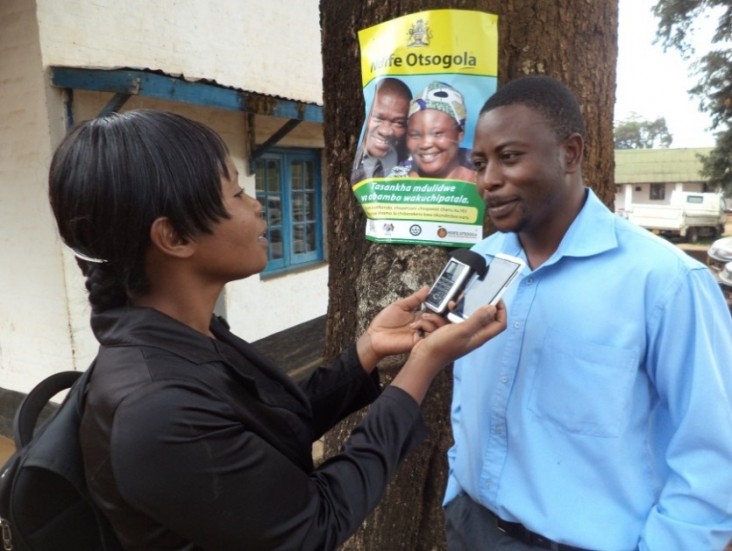
Sept. 2014—Photojournalist Denis Liwasa was among a group of reporters that recently visited Zomba district in central Malawi to get the scoop on the ongoing voluntary medical male circumcision (VMMC) campaign. Inspired by his interviews and experience during the August media tour, Liwasa decided that he, too, would undergo the procedure.
The TV, radio and print journalists met with Dr. Sten Gift Chinomba, the district health officer, and listened intently as his colleagues explained the health benefits of VMMC and the Ministry of Health’s campaign to prevent the spread of HIV in the country. They visited the Police College Hospital—one of eight health facilities offering VMMC in Zomba—and interviewed Assistant Police Commissioner Hillary Kapsala, a satisfied client who has championed VMMC among policemen and the general public. They talked with the son of a Zomba chief, who also underwent the procedure safely.
Liwasa, who works for the Malawi Broadcasting Corp., noted that more than 4,000 VMMCs were performed in the first three weeks of the Zomba campaign, which ran from July 28 to Sept. 6, 2014. He also applauded the innovative ways used to raise awareness and increase demand for VMMC. For instance, boys and men who have undergone VMMC were enlisted to act as community mobilizers, and the Malawi Prison Service Brass Band, which is very popular, was engaged to parade the streets of Zomba township playing and singing songs with VMMC messages. Traditional leaders were also assisted in relaying VMMC messages to their communities, specifically to ngalibas, or traditional circumcisers.
The VMMC project, called Sankhani Moyenela—or Smart Choices—is implemented by Jhpiego and funded by USAID and the U.S. President’s Emergency Plan for AIDS Relief.
Pius Mtike, community mobilization and communications officer for the project in Zomba district, interviewed Liwasa, 34, and a married father of two, to find out why he decided to undergo the “smart cut.”
PM: Are you comfortable to share your experience on your circumcision?
DL: No problem! As a journalist, it is part of my responsibility to advocate for positive behavior for a healthy living.
PM: What do you mean?
DL: You know, there are a lot of things that we journalists work on and publicize—despite the fact that we have not experienced them ourselves. I have, for instance, been covering stories on VMMC for some time now but I was not circumcised myself. Somehow this made me feel like I was lacking.
PM: What else motivated you to get the “smart cut”?
DL: Honestly, my wife contributed to this decision. My wife works as a nurse in one of the hospitals in Blantyre. She has been encouraging me to get circumcised for a while now. She has told me about the benefits of the procedure, especially that it helps to reduce the chances of getting infected with HIV by 60 percent. I am also aware that VMMC benefits women by reducing their risks of contracting cervical cancer. The other thing is that, when I was interacting with clients and service providers at Zomba Police College Hospital, I observed that the environment here is conducive [to a good experience], the hospital is clean and the service providers are friendly to their clients. All these things contributed to my decision to go for the “smart cut.”
PM: I noticed that you announced your decision to the group of journalists that you were with. Why did you do that?
DL: I did that to inspire the other men that I was traveling with.
PM: You are just coming from the operation room, how do you feel?
DL: I feel empowered. The experience of being on the VMMC surgical bed and have my circumcision will change the way I report on this issue. I was worried about pain but the procedure was painless because of the anesthesia that was used. The counseling which I went through before the procedure was also very informative. I have benefited a lot.
PM: How do you intend to use your experience?
DL: Surely, now that I have experienced VMMC, I intend to spread the message of its benefits to others. But I will also emphasize that it is not bulletproof—no one gets 100 percent protection from the procedure. I will also tell people about the advantage of preventing penile cancer in men and cervical cancer in women. In the past, I have been involved in a lot of debates about VMMC but I lacked the experience. Now I will draw from my experience and I will also emphasize that, to win the battle on HIV and AIDS, I will advise men that after circumcision they must still follow the ABC: Abstain from sex, be faithful to one sexual partner and use condoms correctly and consistently.
Malawi officially adopted VMMC as a strategy for HIV prevention in 2012. The procedure reduces a man’s risk of acquiring HIV when implemented as part of a comprehensive HIV prevention package. The U.S. Government is the biggest funder of VMMC services in the country.
Sankhani Moyenela is a four-year project, which runs from July 2013 to July 2017, implemented in three districts in Southern Malawi with high HIV prevalence and a low VMMC rate. The target for 2014 is to circumcise 24,000 men and adolescent boys in all three districts. As of the end of the VMMC campaign on Sept. 6, 2014, over 19,000 had been circumcised.
LINKS
Follow on Facebook







Comment
Make a general inquiry or suggest an improvement.